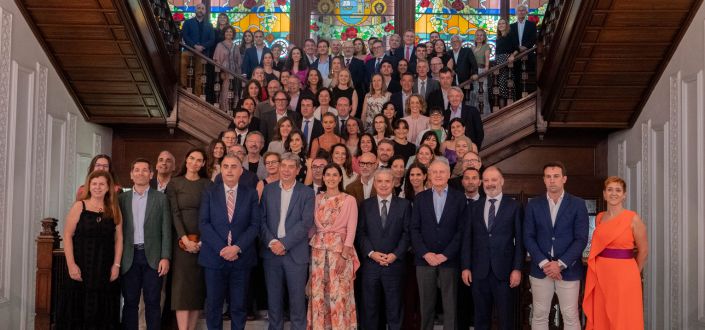The Universidad Europea del Atlántico (European University of the Atlantic, UNEATLANTICO), the Ibero-American University Foundation (FUNIBER), and the Private Foundation for Business and Climate have organised the fourth International Climate Action Congress, which will take place on 1, 2 and 3 July and was inaugurated at the Gran Casino Sardinero.
For the fourth consecutive year, the congress will be held at the UNEATLANTICO facilities, making Santander its permanent venue. The event will feature the participation of companies from around the world, sponsors, and more than 35 international experts in the sector who are committed to the fight against climate change.
The mayor of Santander, Gema Igual, together with Elvira Carles, director of the Fundación Privada Empresa y Clima, and the regional minister for the environment, Roberto Media, attended the presentation, where the official reception for the speakers and participants was held. Also participating were Rubén Calderón, rector of the European University of the Atlantic; institutions such as the Government of Cantabria; and companies such as the Asturiana dairy group, Eco-dualba Gestión, Eurecat, Gullón, Valoria and Xcalibur.
The second day was divided into three topics with corresponding presentations and round tables. The first was on the restoration of nature and biodiversity. The second was on the double materiality matrix and its application in sustainability reports, and the last was on how climate change affects people’s health.
In the section dedicated to nature restoration, the recent approval of the Nature Restoration Law by the European Union was highlighted. This law is part of the European Green Deal and seeks to reverse biodiversity loss and restore degraded ecosystems. It emphasises the global economy’s dependence on natural resources, as well as the urgent need for a more sustainable and resilient production model.
With regard to double materiality, it was explained that this principle establishes what sustainability information companies must include in their reports, considering both social and environmental impacts (impact materiality) and economic risks and opportunities (financial materiality). Since 2021, with the entry into force of the EU’s Corporate Sustainability Reporting Directive (CSRD), this approach has become mandatory for many companies from 2024 onwards. In addition, the concept is evolving towards ‘triple materiality’, which also integrates economic impacts from a broader perspective.
In terms of health, the discussion addressed how climate change—through rising temperatures, extreme weather events, air pollution, and reduced soil moisture—poses one of the greatest threats to global health. The WHO estimates that between 2030 and 2050, there could be 250,000 deaths per year caused by climate factors such as heat waves, respiratory diseases, and cardiovascular diseases. The meeting also warned of an increase in food- and water-borne diseases, food insecurity, and the effects of natural disasters such as forest fires and floods, which affect vulnerable communities around the world.


